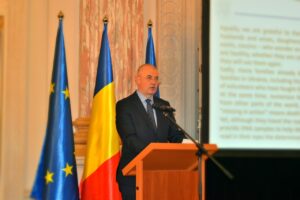
World demand for gold excluding over-the-counter (OTC) transactions in the third quarter of 2025 amounted to 1.26 thousand tons, which is 5% higher than the result of the corresponding period last year, calculated by the World Gold Council (WGC).
Investors continued to play a key role: purchases in ETFs in the third quarter amounted to 222 tons, demand for coins and bars – 316 tons (for the fourth consecutive quarter it exceeded 300 tons). Central bank purchases also remain at a high level of 220 tons – 28% more than in the previous quarter.
Supply in the gold market increased by 3% to 1.31 thousand tons. This is a quarterly record in the history of observations. The excess supply, 55 tons, was absorbed by the OTC market.
Earlier, the Experts Club think tank presented an analysis of the world’s leading gold producing countries in its Youtube channel video – https://youtube.com/shorts/DWbzJ1e2tJc?si=YuRnDiu7jtfUPBR9.

Issue #2 – October 2025
The purpose of this review is to provide an analysis of the current situation on the Ukrainian currency market and a forecast of the hryvnia exchange rate against key currencies based on the latest data. We analyze current conditions, market dynamics, key influencing factors, and likely scenarios.
Analysis of the current situation on the currency market
International context
The second half of October was influenced by expectations of the next decision by the Federal Reserve Committee on the key policy rate. The previous 25 basis points cut in September was a result of the strategy to achieve 2% inflation. Then in September, the Fed began a cycle of easing, and at the October 29 meeting of the Committee, it decided to cut the key policy rate by 25 basis points to the range of 3.75-4%. As Fed Chairman Jerome Powell said at a briefing on October 29, the outlook for employment and inflation has not changed much since the September meeting, with labor market conditions deteriorating and inflation remaining slightly elevated.
Thus, the US economic outlook is somewhat worrisome for investors. However, optimism in the markets increased in late October, mainly due to messages from President Donald Trump regarding further cooperation with China. On October 29, Donald Trump said at the Asia-Pacific Economic Cooperation summit in South Korea that he believed the United States would “make a deal” with China and that it would be a “good deal for both sides.” Trump and Xi Jinping met on October 30. As a result, the US president said that the parties had agreed to reduce overall duties on Chinese goods from 57% to 47%, and China promised to continue exporting rare earth metals.
In general, the dollar strengthened against the euro in October on the back of the expected decision of the Fed Committee on the key rate and the plans announced by the White House for a meeting between Donald Trump and Chinese President Xi Jinping. So it’s no surprise that on October 29, the EUR/USD rate held at 1.1630. This is actually an echo of positive market sentiment, driven by the Fed’s policy easing and the expectation of an agreement between China and the United States. However, some pullback in the direction of a fall in the dollar remains possible in the near future, as the deteriorating situation in the US labor market may play against the dollar.
Meanwhile, in the EU, investors expect the European Central Bank (ECB) to keep interest rates stable at its meeting on Thursday, October 30. Later, the ECB will release preliminary GDP data for the third quarter and inflation data for October, but it seems that there are no surprises from the ECB, and the rate will remain at 2%.
In general, the picture for the EU is quite stable, although there are some reservations about further economic growth in the eurozone, in particular in 2026, amid new US tariffs on imports from Europe. The euro is also influenced by expectations about the development of trade relations between the US and China, and the actual outcome of negotiations between the two countries may contribute to some increase in the volatility of the EUR/USD pair.
In Ukraine, the dollar strengthened faster in late October than in global markets, where the EUR/USD exchange rate has shown a strengthening of the dollar from 1.1685 to 1.1630 since the beginning of October. It is worth noting that the scenario of a change in the Fed’s key policy rate has already been priced into the international market, so this aspect will have the least impact on exchange rate fluctuations in the near future.
Domestic Ukrainian context
In October, the Ukrainian foreign exchange market saw a trend of devaluation of the national currency. Since the beginning of October, the hryvnia has been steadily weakening against the dollar: as of October 29, the official exchange rate reached 42.08 UAH/USD, while on October 1, the rate was 41.14 UAH/USD. Thus, the hryvnia has lost 2.28% in almost a month. The exchange rate on the cash market is also changing accordingly, with the average exchange rate in banks as of October 29 at UAH 42.25 per dollar.
Demand for foreign currency on the interbank foreign exchange market is growing, but the National Bank is in no hurry to increase interventions. In fact, we can state that the devaluation is being managed and is being carried out under the strict control of the NBU.
In October, Bloomberg reported on the IMF’s position on the hryvnia exchange rate. The publication said that the Fund was putting pressure on the National Bank to conduct a controlled devaluation of the hryvnia. The IMF believes that devaluation will be a way to strengthen the financing of the state budget, but the NBU disagrees because of the high risks of inflation. Devaluation is indeed partially justified by the possibility of converting funds received from Ukraine’s creditors and partners at a better rate, increasing the volume of state treasury revenues. However, a sharp devaluation would be a rather risky decision. At the moment, we are talking about a gradual weakening of the hryvnia exchange rate, which is fully controlled by the NBU.
In our opinion, the exchange rate fluctuations in October were influenced by three main factors: the strengthening of the dollar in global markets, increased demand for foreign currency from importers, including energy goods and equipment, and the need to be guided by the exchange rate parameters set in the draft new state budget for 2026. As a reminder, the document refers to an average annual hryvnia exchange rate of UAH 45.7 per dollar.
An important trend in October was a marked increase in demand for cash foreign currency from the population. There was also a noticeable increase in demand for dollars in September, when net purchases of foreign currency by households reached $382.7 million. The official figures for October are likely to be higher than those for September. Banks have noted an increased demand for non-cash purchases of foreign currency, which is also an important sign of expectations of further hryvnia devaluation.
The most important factors influencing exchange rate volatility are the war and news from the frontline, shelling of energy infrastructure, and the passage of the psychological mark of the exchange rate – the level in the cash market of more than UAH 42 per dollar.
The National Bank of Ukraine will act cautiously, traditionally adhering to its position of smoothing out significant market fluctuations and trying to maintain a certain balance in the interbank market. The main factors that will influence exchange rate changes are the balance of supply and demand in the market, the NBU’s readiness to intervene, and the rhythmic flow of international aid. It is also important to know what the new arrangements with the IMF will be like, as it is known that IMF Managing Director Kristalina Georgieva plans to visit Ukraine to discuss a new loan package, which may amount to (but has not yet been officially confirmed) $8 billion.
US dollar exchange rate: dynamics and analysis
General characteristics of market behavior
In October, the dollar experienced slight fluctuations in the international market, and the US currency continued to strengthen in the Ukrainian market.
During the month, the exchange rate gradually went up: the average buying rate rose from UAH 41.01 to UAH 41.8, the selling rate from UAH 41.52 to UAH 42.25, and the official NBU rate from UAH 41.14 to UAH 42.08. The dollar is strengthening smoothly and steadily.
In October, the buying rate was in the range of UAH 41.0-41.77/$ on the cash market (weighted average rate), and the selling rate was in the range of UAH 41.38-42.15/$. At bank cash desks, the spread between the buying and selling rates grew throughout the month and in large retail banks amounted to UAH 0.45-0.6 per dollar at the end of October.
Key factors of influence
Forecast.
Euro exchange rate: dynamics and analysis
General characteristics of market behavior
In October, the euro on the Ukrainian market moved toward appreciation in line with the domestic trend of hryvnia devaluation, taking into account the situation on global markets. While on October 1, the official euro exchange rate was at 48.3 UAH/€, on October 29 it was 48.98 UAH/€.
Key observations
Ø Exchange rate geometry:
o The euro selling rate in Ukraine moved in different directions in October, but after October 21, it took a steady upward course.
o The buying rate continues to move actively away from the selling rate, with the spread between the rates in banks growing and at the end of October in the range of UAH 0.8-1 per EUR.
Ø Supply and demand:
o Demand for cash euros in Ukraine initially fell during October, but after the trend of hryvnia devaluation became clearer in the second half of the month, demand in the cash segment increased significantly.
o The spread between buying and selling euros, which is significantly different from the spread in the dollar segment, continues to grow, which indicates that banks and financial institutions are not confident in the stability of this currency: a high spread is always a payment for risk and high volatility.
Key influencing factors
Forecast.
Recommendations: dollar or euro – buy, sell, or wait?
USD/UAH
The strengthening of the dollar in the fall of 2025 was driven by optimism about the start of a new phase of trade discussions between the US and China, as well as by the levels of fluctuations that the markets had already set in advance due to the next stage of monetary policy easing in the US.
The dollar will now play a major role in the structure of savings, and it is advisable to continue buying it in tranches from time to time. However, for short-term gains, a partial exit from the dollar is also possible after a thorough analysis of the investment strategy.
Further strengthening of the dollar and a clear devaluation trend provide opportunities to generate a return on dollar investments. However, globally, in an unstable hryvnia environment, such an exit should be accompanied by additional security measures, such as strong capital preservation strategies and further hryvnia investments in liquid assets. For a medium-term strategy, it is advisable to keep the dollar as the basis of the currency portfolio.
EUR/UAH
The euro is showing an upward trend in the Ukrainian market, and the high level of fluctuations does not allow for a full assessment of future dividends from the purchase of assets in euros. In the medium term, the euro will strengthen against the US dollar. It is advisable for investors to hold 20-30% of their portfolios in euros, given the need to diversify their savings.
It is not advisable to sell the euro at current levels, as the projected growth potential shows levels above UAH 50/€ in the coming months. The euro can be a base currency for speculative transactions due to the high spread and more active exchange rate dynamics.
Overall strategy
The Fed’s key policy rate cut and the latest US labor market data may lead to a weaker dollar. In the long run, the dollar will be supported by new agreements between the US and China, as they currently indicate a de-escalation of relations between the two countries. The euro will be supported by the ECB’s data on inflation and GDP growth in its member states.
Investors should choose the dollar as their savings base for the near future, but regularly review their portfolio for diversification and the presence of other liquid currencies. The euro can be an important part of a portfolio, especially given the unstable situation in the United States and investors’ uncertainty about further economic growth, as well as President Donald Trump’s mixed statements that could provoke market outbursts.
There is a clear trend of hryvnia devaluation in the Ukrainian market, which gives investors good reason to invest in the dollar as a base currency and the euro as a currency for diversification and possible short-term and speculative transactions. A good strategy is to preserve savings by entering the dollar and increase the possibility of profitable earnings on exchange rate fluctuations in the euro. Given the high chances of the dollar strengthening in the Ukrainian market, the US dollar will remain the main means of preserving and increasing foreign currency investments in the long term.
This material has been prepared by analysts of the international multiservice product FinTech platform KYT Group and reflects their expert, analytical professional judgment. The information presented in this review is for informational purposes only and cannot be considered as a recommendation for action.
The Company and its analysts make no representations and assume no liability for any consequences arising from the use of this information. All information is provided “as is” without any additional warranties of completeness, obligations of timeliness or to update or supplement.
Users of this material should make their own risk assessment and informed decisions based on their own evaluation and analysis of the situation from various available sources that they consider to be sufficiently qualified. We recommend that you consult an independent financial advisor before making any investment decisions.
REFERENCE
KYT Group is an international multi-service marketplace FinTech product platform that provides financial companies with access to services for promoting their services, as well as advertising and consulting services.

The buckwheat harvest in Ukraine in 2025 is 15% lower than a year earlier, which is not a problem for the domestic market, but will lead to price increases due to frenzied demand provoked by the media, said Rodion Rybchinsky, director of the Ukrainian Flour Millers Association.
“As far as I understand, this year’s buckwheat harvest is already 15% lower than last year’s. Questions about its availability should be addressed not to processors, but to farmers engaged in agribusiness,” he said at the Agro2Food Profit forum in Kyiv on Wednesday.
The expert explained that farmers themselves decide what is profitable for them to sow—sunflowers, soybeans, rapeseed— and then defend their rights to export soybeans and rapeseed to the Ministry of Economy and the State Tax Service without paying a 10% export duty, or to sow buckwheat, which yields 1.3-1.5 tons/ha, and then sell it for UAH 20,000 per ton.
Responding to a question about the reasons for the rise in buckwheat prices this year, Rybchinsky said that there were no reasons, but prices would still rise.
“Some newspaper or Telegram channel started shouting this week that buckwheat is getting more expensive. People listened and rushed to the supermarket. They see that buckwheat is selling for 25 UAH/kg, and tomorrow it will be 30 UAH/kg. They bought it all up. The warehouses of processing plants are empty. Retailers are starting to ask the authorities, ‘Where is the buckwheat? ’ And it’s with the farmers, who are waiting for prices to rise to 40 UAH/kg and are not releasing the product. They are doing this because consumers have bought up all the product at 25 UAH/kg,” explained the head of the industry association.
Rybchinsky recalled that the rush demand for buckwheat, rye, and other products occurs steadily every three to four years.
“Ukrainians do not eat buckwheat in such quantities as the media try to portray. Buckwheat is primarily needed by people with diabetes. Other consumers can do without it, because Ukraine produces more corn and wheat groats than it needs for domestic consumption,” emphasized the head of the Ukrainian Flour Millers Association, urging Ukrainians not to react to the artificially created hype.
As reported, in the 2025 season, Ukrainian farmers reduced the area under buckwheat to 69,100 hectares, compared to 90,300 hectares a year earlier. As of October 24, buckwheat has been harvested from 86% of the production areas with a yield of 14 tons/ha, yielding 83.3 thousand tons, compared to 126.9 thousand tons a year earlier.

Romania and its allies will not remain passive witnesses to the tragedy unfolding in Ukraine and will do everything possible to achieve a just and lasting peace, said Alexandru Victor Micula, Romania’s Ambassador Extraordinary and Plenipotentiary to Ukraine, during a reception in Kyiv on the occasion of Romanian Army Day.
“We are in Ukraine and we think of those who are fighting right now for independence, sovereignty, and territorial integrity, who stand as a shield in defense of democratic societies against bloodthirsty Moscow autocrats. We are grateful to them for their daily sacrifice,” the diplomat emphasized.
According to him, Romania and its partners “have a duty to these heroes and their families to do everything possible to establish a just peace for Ukraine — a peace that cannot be a reward for the aggressor and must ensure justice for the victims of this illegal and unjustified aggression.”
Micu expressed his deep gratitude to Ukrainian servicemen and their families, especially those of Romanian origin, who live in daily anxiety for their loved ones.
“Many families already know that their heroes will not return home. Among them are the families of Ukrainians and Romanians who gave their lives defending Ukraine. But even those who are waiting for news about the missing do not lose hope. This is a true manifestation of courage and strength of spirit,” the ambassador said.

During the event, Romania’s naval and air attaché to Ukraine, Colonel Cristi Ladaniuc, emphasized that Romanian Army Day is not only a tribute to national heroes, but also a symbol of Romania’s unwavering commitment to peace and security in the region.
“From the first day of Russia’s unprovoked and unjustified aggression against Ukraine, Romania has played an important role in supporting Kyiv in all areas of assistance,” Colonel Ladaniuc said.
He stressed that Romania is actively involved in training Ukrainian military personnel under the EUMAM and INTERFLEX programs and that Bucharest “will continue to coordinate with Ukrainian partners to identify new training opportunities in line with needs.”
The attaché also drew attention to the creation of the European F-16 Training Center in Romania, where Ukrainian pilots are already participating in flight programs. “This project demonstrates what we can achieve together — through partnership, strategic decisions, and joint efforts toward our common goals,” he emphasized.
Romania, he said, will also continue to participate in the Maritime Capabilities Coalition, providing maritime security training (MRTH) on its territory and facilitating the training of Ukrainian marines within existing programs.
At the same time, he stressed that Romania, in accordance with a political decision at the highest level, is ready to provide logistical support to future peacekeeping forces, but will not consider the possibility of deploying its military on Ukrainian territory (“no boots on the ground”).
Ukraine and Romania established diplomatic relations on February 1, 1992.
The Ukrainian Embassy in Romania opened in Bucharest in 1992, and the Romanian Embassy in Ukraine opened in Kyiv in 1993.
Both countries are members of the Organization of the Black Sea Economic Cooperation (BSEC) and actively cooperate in the fields of defense, energy, border management, and support for Ukraine in the context of Russian aggression.

In Ukraine, 88 flour milling enterprises have resumed work since the beginning of the full-scale war, with 22 enterprises starting work in 2024 and 10 in 2025, said Rodion Rybchinsky, director of the Union “Flour Mills of Ukraine”.
“As of the end of 2021, there were 678 industrial enterprises in Ukraine that worked in the grain processing industry. Unfortunately, during the full-scale invasion we lost 192 enterprises. They either remained in the temporarily occupied territories, or destroyed to the ground and stopped their work, or enterprises that were partially affected, or due to lack of raw materials, logistics capabilities suspended work,” he said during the Agro2Food exhibition in Kiev on Wednesday.
The expert noted that starting from 2023, Ukraine has begun to restore the grain processing industry. Rybchynskyy named the problem with grain exports in 2022 as the reason for this.
“Many agricultural producers saw a way out of the situation in opening grain processing facilities. They invested their funds. In addition, the state began to provide grants for restoration and for increasing processing capacity,” he explained.
According to Rybczynski, since the start of the full-scale war, 66 grain processing enterprises have resumed their work, while 22 enterprises started working from scratch in 2024. At the same time, about 10 grain processing plants were launched in 2025.
Analyzing the specialization of new plants, the head of the Union “Flour Mills of Ukraine” noted that 40% of new enterprises are engaged in the production of flour, 30% produce cereals, another 30% – pasta. Geographically, the new enterprises are located in western and central Ukraine.
Rybchynskyy emphasized that it is the construction of new plants, not relocation, because processing companies depend on the existing raw material base and consumers. He also noted the difficulty with transportation of mills, search for a new land plot.
According to the estimation of the head of the Union “Flour Mills of Ukraine” the cost of relocation of a mill costs its owners about $1 million. According to Rybchynskyy, grain processing enterprises that relocated their capacities can be “counted on the fingers of one hand”.
The expert added that as of 2024 Ukraine produced 2.34 million tons of flour, which is 22% less than in 2021 before the war, when the state produced 3 million tons.

Ukrainian one-dollar store chain Aurora plans to start operations in Bulgaria by opening test locations within the next six months, co-founder and CEO Taras Panasenko said in an interview with NV.Business.
According to Panasenko, the choice of Bulgaria is due to logistics: the chain is already developing its business in Romania and can deliver from its Romanian warehouse without crossing the EU’s external customs border.
Current geography of operations. Aurora operates in Ukraine and Romania. The first store in Romania opened in October 2023, and the chain is expanding rapidly. In July 2025, it announced the opening of its 50th store in the country (the first in Bucharest).
The company had also previously announced plans to enter Moldova, but there are currently no reports of it starting operations there.
Aurora is a Ukrainian multi-format chain of inexpensive everyday goods that has been expanding internationally since 2023, starting with Romania.